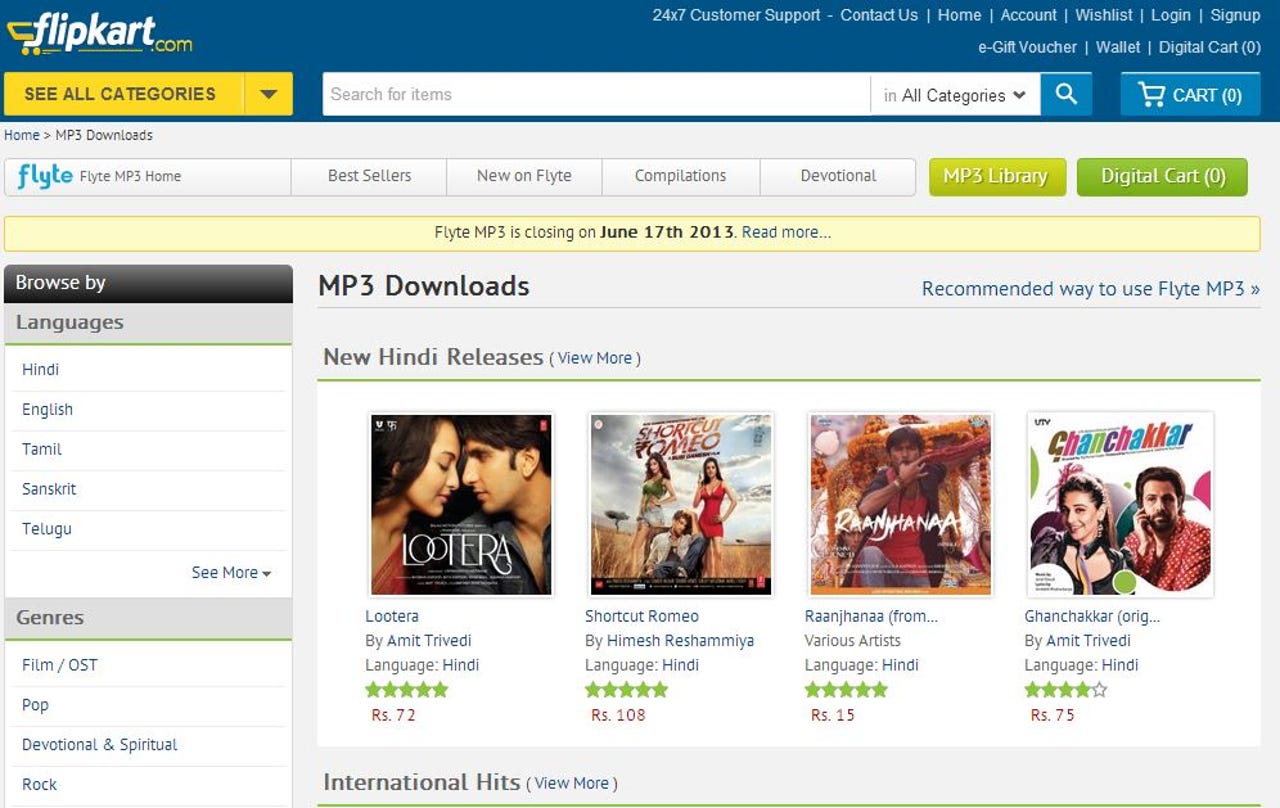Indian startup Flipkart shuts its digital download service

A couple of days ago I received an e-mail from India's largest ecommerce startup, Flipkart. It announced the closure of Flyte, its digital music store. Flyte primarily competes against Apple's iTunes Store, but has failed to find enough users.

I've been a regular customer at Flipkart including their service called Flyte. When it said that the digital music download service will no longer be active it was kind of dissapointing for me, specifically because it's a great marketplace to find rare Indian songs and some music which may not be readily available elsewhere. After one year in service they have decided to shut down their service.
I read an article on NextBigWhat, a technology startup blog in India where Mekin Maheshwari, head of Digital Media and Payments, Flipkart said:
"We have realized the music downloads business in India will not reach scale unless several problem areas such as music piracy and easy micro-payments etc are solved in great depth. We feel that at present, it makes sense to take a step back from Flyte and revisit the digital."
In the e-mail to its customers, the company advised them to use up their balance in Flyte Wallet before June 17, 2013. Flipkart will refund the unused balance otherwise. They also recommended that their customers should download their purchased MP3 files by August 18 after which they will not be available.
As mentioned on the NextBigWhat blog, a bit of history about Flyte for those who may nott know what this service was all about.
Flyte began with a catalog of a million tracks from 150,000 albums. It now has an aggregated catalog of over 5 million Indian and international tracks. Flyte provides DRM (Digital Rights Management)-free MP3 files at prices starting from 6 rupees (US$0.10) a song and 25 rupees (US$0.44) for an album.
The service crossed 600,000 downloads some eight months ago, as reported by the site. However, Flipkart said in February this year that its current registered user base for Flyte was around 100,000, which enabled a total of 2.5 million downloads or songs.
What's the startup lesson for entrepreneurs?
One of the things I thought Flyte was really good was because it had unique and very good collection of Indian songs and their product had offerings which were unique in taste. Of course, if you weren't able to get it elsewhere, you'd go ahead and buy it from Flyte. In India there are bandwidth constraints and micro-payment tools is quite a bit of challenge. Normally to enable a song download from Flyte, customers need to pay around 6 to 15 rupees. And to pay such a small amount it is unlikely that customers would use his or her credit card.
Other than that, if users are getting that song via torrents or pirated sources, then customers would certainly won't be that willing to pay for those songs.
Piracy is a big issue in India. And to add to that there are other digital streaming Web sites and apps like Saavn, Dhingana, Raaga, Hungama.com, thus creating more resistance for users to actually go and purchase a song or album on Flyte.
A major thing and a reason why Flyte failed, was because of a lack of traction. A key lesson for any startup obviously is that traction drives a lot of the business at any given point in time.
Also as mentioned by Nikhil Pawa, founder of Founder of @medianama, a popular Web site covering technology and startups:
"Revenues from Flyte Music grew in a linear manner, unlike Flipkart’s physical goods business, which was growing exponentially, month-on-month. Flyte, with low revenues and low growth, remained a low priority business, and it never got the marketing support needed to push for an increase in sales."
It's apparent that this was something that most of the folks in the industry saw coming. It was only a matter of time. However there certainly seems to be talk about what could Flyte evolve into and if and when they do come back, will they go the Spotify, Gaana, Saavn way to ensure that consumer traction is better because of the challenges faced currently.
What your thoughts are about this?